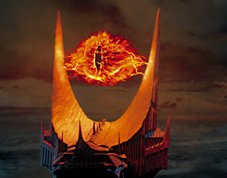Walter Sobchak: Over the line!
Smokey: Huh?
Walter Sobchak: I'm sorry, Smokey. You were over the line, that's a foul.
Smokey: Bullshit. Mark it 8, Dude.
Walter Sobchak: Uh, excuse me. Mark it zero. Next frame.
Smokey: Bullshit, Walter. Mark it 8, Dude.
Walter Sobchak: Smokey, this is not 'Nam. This is bowling. There are rules.
The Dude: Walter, ya know, it's Smokey, so his toe slipped over the line a little, big deal. It's just a game, man.
Walter Sobchak: Dude, this is a league game, this determines who enters the next round robin. Am I wrong? Am I wrong?
Smokey: Yeah, but I wasn't over. Gimme the marker Dude, I'm marking it 8.
Walter Sobchak: [pulls out a gun] Smokey, my friend, you are entering a world of pain.
The Dude: Walter ...
Walter Sobchak: You mark that frame an 8, and you're entering a world of pain.
Smokey: I'm not ...
Walter Sobchak: A world of pain.
Smokey: Dude, he's your partner ...
Walter Sobchak: [shouting] Has the whole world gone crazy? Am I the only one around here who gives a shit about the rules? Mark it zero!
—The Big Lebowski
Today, the sports talk world is abuzz with discussion of the
odd ending to yesterday's Dodgers game. The Dodgers held a 5-4 lead in the 9th inning, with the Giants having loaded the bases. Acting Dodgers manager Don Mattingly came out for a conference on the mound. So far, pretty standard baseball. Then, after the conference, Mattingly took a step or two off the mound to answer a question from first baseman James Loney, then stepped back on the mound for a last word to pitcher Jonathon Broxton before exiting the field. Giants manager Bruce Bochy immediately called for the umpires to rule that Mattingly had made a second trip to the mound in one inning. The umpires conferred, agreed with Bochy, and ruled that Mattingly was required to remove Broxton from the game because of the "second" visit to the mound. The relief pitcher, George Sherrill, came in essentially cold, and promptly gave up three runs, giving the Giants a 7-5 victory.
(Interesting historical note—The
umpire crew chief for the game was
Tim McClelland, who almost 27 years ago was the then-rookie home plate umpire who ejected George Brett in the infamous
pine tar game, and more recently was home plate umpire and crew chief during the Sammy Sosa
corked bat incident. McClelland lives in the Des Moines area, and I ran into him on several occasions years ago when he was coaching his sons' AAU basketball teams and I was a referee. McClelland is a towering man with a booming voice, but he was always a complete gentleman as a coach, respectful of referees, players, coaches, and parents. Truly a class act.)
Now, the
applicable rule does define a visit to the mound as ending when the manager steps off the mound (which is equivalent to the 18 foot circle referenced in the rule itself). The rule has an important purpose, which is to speed up the game by limiting the number of conferences a manager can have per inning. But the application in this case might strike some as being hyper-technical, a violation of the letter but not the spirit of the rule. On the other hand, if an umpire doesn't strictly enforce the rule, where does he draw the line? What if a manager took 5 or 6 steps, then came back to the mound? Ten steps? All the way up to the foul line? Given that this occurred in a Major League game, I really don't have a problem with a strict enforcement of the rule; coaches and managers are paid hundreds of thousands of dollars to know the details of the rulebook. In a Little League or high school game, I would expect the umpires to be a little more relaxed about this type of rule.
After reffing basketball for nearly twenty years, and with some random officiating of a number of other sports, I have come to regard dealers and floors as being the "referees" of poker. Just like sports officials, dealers and floors have to know the rules of the game (including varying sets of rules), they need experience to discern rules violations and apply the rules properly, they need the ability to explain their rulings to players, and they need to use good judgment in situations where they are able to exercise some degree of discretion. And, just like sports officials, dealers and floors often have to take a certain amount of abuse from players after rendering a decision.
Now complaints about poker rules and rulings are commonplace enough to generate intense discussions on most poker
forums and
blogs. Not suprisingly, poker rules maven
Poker Grump has collected a vast
menagerie of rules issues, some where a dealer or floor ruled in error, but most where a dealer enforced a rule and took some grief because of it. Just this week, the Grump has written about a
situation where a player tried to correct a mistaken wager, and defended a dealer who
enforced the one player to a hand rule, despite some player grumbling.
Nearly every poker player will complain on occasion about poker rules or rulings, but truth be told, we all rely on dealers and floors to make correct and fair rules decisions. Players violate rules, inadvertantly and intentionally. Strange situations arise that depart from normal play. Disputes arise between players as to whether someone has acted improperly, or a particular action is permitted. What exactly should poker players reasonably expect from their dealers and floors when it comes to rules enforcement?
First off, poker players need to realize that there are rules, and then there are
rules. Not all rules are created equal. Some rules are absolute, some rules are flexible, and some rules are more like customs or
guidelines. Rules can be roughly broken down into four categories:
- Fundamental rules—Rules that define the essential nature of a game. Poker requires a 52-card deck, has betting/raising/calling/checking/folding actions, and has hand ranks. If you can't bet, or if a flush beats a full house, it isn't poker. Similarly, hold 'em has two hole cards and five community cards. Give a player four hole cards, and it isn't hold 'em.
- Structural rules—Rules that establish the parameters for a particular game. Poker can be played with fixed limit, pot limit, or no limit betting; as a cash game or a tournament; heads up, full ring, or six-max; and one game, two games, or multiple games.
- Procedural rules—Rules that govern the actual competition part of the game. These rules cover dealing and handling cards, order of play, manner of betting, and player conduct.
- Administrative rules—Rules that are peripheral to the competition part of the game. These rules do not directly impact the game, but enable the game to be run in a smoother fashion. These rules cover issues such as buy-ins, seat and table changes, and cell phone use.
Essentially, the fundamental and structural rules are fixed and not subject to any alterations or exceptions by the dealers or floors, and players expect no such variances. The procedural and administrative rules, however, are the ones most subject to confusion and violation, and the ones which require the most enforcement and interpretation by dealers and floors. These rules also are ones which may require a degree of flexibility in enforcement.
Second, players must accept that some rules are arbitrary, and may vary from game to game, room to room, tournament to tournament. Don't like the button straddle? Perturbed about a tournament structure? Hate having to post in, or being unable to buy the button? Mad that you can't talk on your cell phone? Tough luck. Don't whine to the dealer or floor about how much better it would be if different rules were used, you know, like the ones at Shangri-La Poker, where there is no rake and every player sets his own rules. Instead, direct your complaints to a
manager, and either suck it up and play, or move along to another room. (Of course, you can and should
whine about bad rules in your blog!).
Third, players should expect strict enforcement of rules which relate to the integrity of the game. A player should not need to prompt a dealer to enforce the "English only" or "one player to a hand" rules.
Fourth, players should expect consistent enforcement of rules. The regular, the high roller, and the good tipper should not be given favorable rulings or preferential treatment merely because of who they are. Likewise, the grumps, grouches, whiners, and jerks deserve a fair ruling, although abusive conduct need not be tolerated.
Fifth, players must accept that there will be judgment calls, and those judgment calls may not be consistent from game to game, dealer to dealer, floor to floor, shift to shift, day to day, room to room, tournament to tournament. The toughest rules decisions occur when a situation arises where two conflicting rules may apply, or where strict application of a rule may have an unfair result or unintended negative effect on the game. Those tough rules decisions are necessarily dependent on the unique factors presented by the situation, including the experience level of the players, the type of game, how the situation arose, what can be discerned as to the relative "fault" or "motives" of the players involved, and the potential consequences of various rulings. To analogize to my basketball reffing days, a minor travel or other violation might be an automatic whistle in a high school varsity game, but might be ignored or only get a warning in a junior high game. Or, contact that might need to be called a foul in one game might be perfectly acceptable contact in another game. In these types of rules situations, poker players need to recognize that dealers and floors may reasonably come to different decisions at different times, and it is irrational and unhelpful for poker players to insist that these kinds of rulings be consistent with a ruling from a similar situation in a different game or another poker room.
"Rules are not necessarily sacred, principles are."
—Franklin D. Roosevelt
Sixth, poker players must accept that some rulings may go against them, or might seem unfair. But those decisions are much like bad calls in sports; they are going to happen, so there is no point in getting upset when they occur. No dealer or floor is perfect, but the truly incompetent ones eventually tend to find themselves in other lines of work. However, no dealer or floor intentionally screws up, so when they do err, it is better to accept it and move on than to dwell on it and let it distract you from your play.
Seventh, and finally, poker players must remember that dealer and floor rulings are only a small part of their success or failure. Dealers and floors don't overplay weak hands, make stupid bluffs or silly hero calls, play above their bankroll, succumb to fancy play syndrome, or play while drunk or on tilt. Only those poker players who can honestly say they are playing perfectly should ever even think about blaming a dealer or floor for their poor results.
Let's all try to cut our dealers and floors a little slack.
"Young men know the rules, but old men know the exceptions."
—Oliver Wendell Holmes











